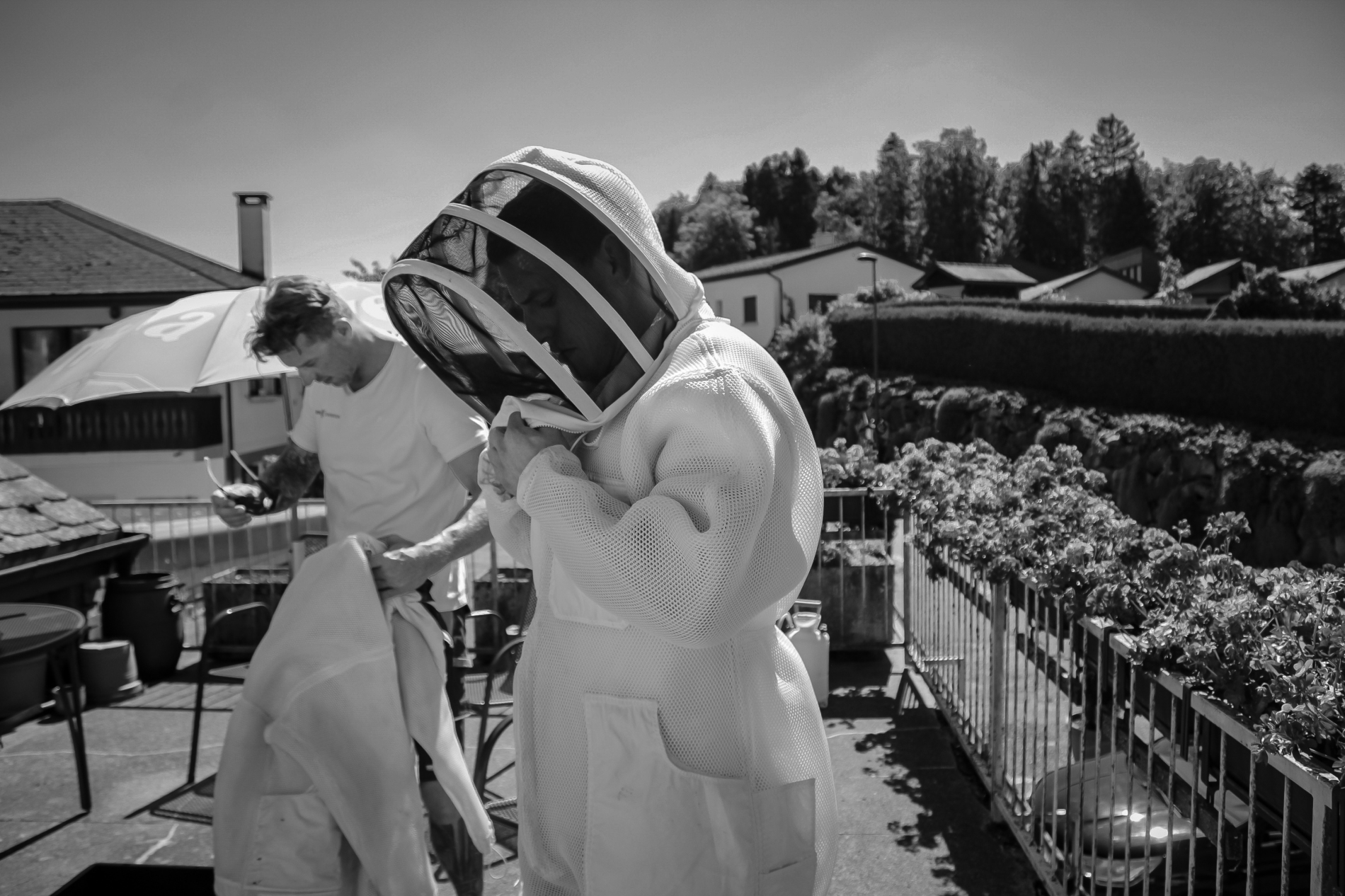
Fighting Asian hornets in Schluein
Have you discovered an Asian hornet's nest? We'll be on site quickly! Call now - Daily Mon-Sun 07:00-21:30. Contact us now: 058 510 22 54
Having the Asian hornet's nest removed
Vespa velutina, a species of hornet from South-East Asia, has aggressively invaded Switzerland and the entire subcontinent. Despite its non-threatening behavior towards humans, this hornet has become notorious for its hunting of honey bees, causing anxiety among beekeepers. A few of these hornets can attack and eliminate a bee colony within just a few hours. If you have discovered a hornet's nest on your house, patio, shed, or in your blind box, contact our experts for hornet nest removal in Schluein!
Use the uncomplicated telephone service of the Hornet experts in Schluein and simply inform us at 058 510 22 54, we will be on site quickly so that you and everyone in your area feel completely safe again.
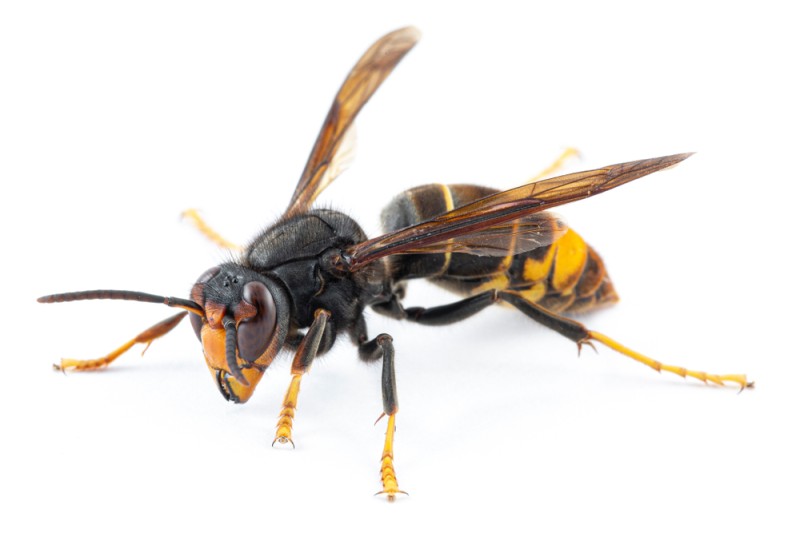
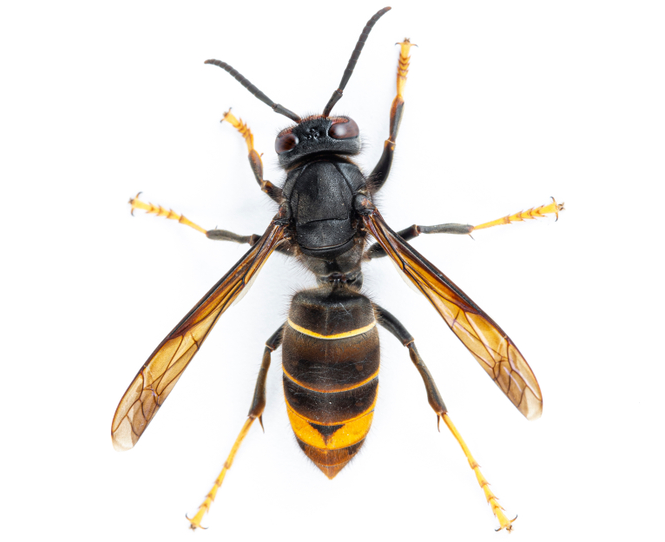
Appearance of the Asian hornet
Here are some characteristics that distinguish the Asian hornet:
1. Size: The queen can reach a length of about 3 cm, while the workers are slightly smaller and measure about 2.5 cm.
2. Color: The Asian hornet has a dark body that is almost black, with a yellow stripe at the back of the abdomen. Its face is orange-yellow.
3. Wings: The wings are dark and almost smoky gray.
4. Legs: The hornet has yellow tips on its legs, which is a striking distinguishing feature when it flies.
5. Nest: The Asian hornet's nest is often high in the trees, but it can also be found underground or in tall structures such as chimneys. It has an oval shape and is made of chewed wood, which gives the hornet a papery texture.
It is important to distinguish the Asian hornet from the European hornet (Vespa crabro), which is more harmless and a natural part of the European fauna. If you suspect you have found an Asian hornet nest near you in Schluein, you should report this to the local authorities, or using our reporting form, as they can spread quickly and be harmful to bees and other insects. To avoid being attacked by the flying inhabitants, you should hire a professional pest controller such as the Hornet Experts Schluein. We can identify the nest beyond doubt and take further steps to remove the Asian hornets professionally.
News about the Asian hornet in Schluein
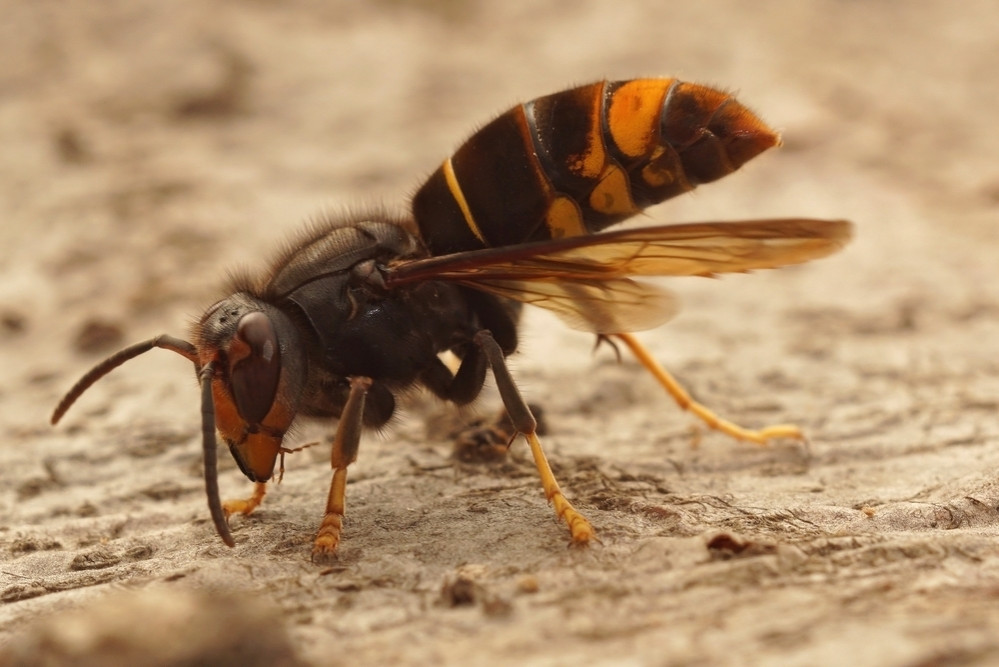
02.12.2025 Western Switzerland: Killer hornet eats bees
The territory of the Asian killer hornet has expanded considerably this year, with a notable increase reported in western Switzerland. This invasive species poses a significant threat to native bee populations, as bees make up the majority of its diet. The potential consequences are serious. Moreover, the hornet represents a danger to individuals with allergies to its venom.
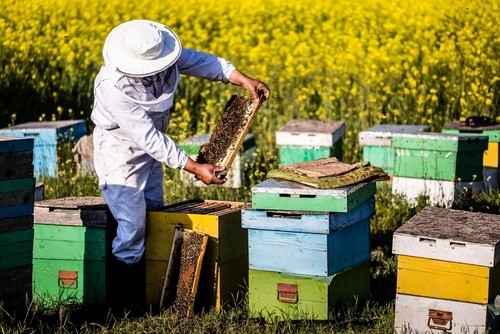
25.11.2025 Serious concerns about the bee population!
Asian hornets are inflicting significant harm on beehives across multiple parts of Europe, as reported by local beekeepers. Even a small number of hornets can destroy an entire bee colony within hours. This sharp decline in pollinators could have serious consequences for pollination, local ecosystems, and agricultural productivity.
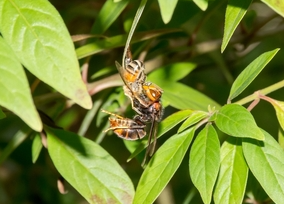
18.11.2025 Asian hornet doesn't just eat bees!
The danger it presents to insects is substantial!
The Asian hornet feeds largely on honeybees—up to 85 percent of its diet—alongside beetles and flies. This high level of predation not only poses difficulties for fruit growers but also further threatens already vulnerable bee populations.
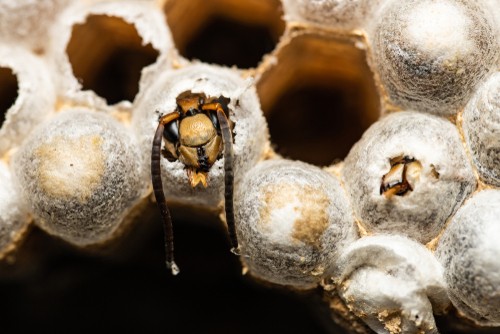
11.11.2025 How did the Asian hornet get to Europe?
The Asian hornet likely arrived in Europe unintentionally and has quickly expanded throughout France and nearby countries. Its adaptability to different environments and the absence of natural predators have contributed to its rapid spread. A single nest can generate several hundred new queens in one breeding season.
Asian Hornet Reporting Form
Please fill out all required fields and submit the form.
Help us!
If you discover an Asian hornet or a nest of this invasive species in Schluein, it is of the utmost importance that you report it immediately. The Asian hornet is not only dangerous to humans, but also poses a serious threat to native bee populations and the ecological balance in Switzerland.
Why is it important to report the find?
When the Asian hornet takes hold in a region, it has a major effect on native insects, honey bees in particular. By preying on bees, these hornets contribute to a decline in pollinator populations, thereby exerting a significant impact on local flora and agricultural yields. By reporting sightings, experts can react quickly, remove the hornets or their nests and thus prevent the spread of this invasive species.
Notification form for sightings
In an effort to combat the increasing presence of the Asian hornet in Switzerland and preserve our native insect diversity, we urge you to report any suspicions or sightings using our specially designed reporting form. With your partnership, we can promptly respond and minimize the impact of this harmful species within our ecosystems.
Your contribution is crucial in the fight against the Asian hornet in Schluein. Together we can protect nature and maintain the balance of our ecosystems;
Thank you for your vigilant attention and your commitment to protecting our environment.
How dangerous is the Asian hornet?
The Asian hornet (Vespa velutina) is a predatory insect that originated in Asia and has spread in recent years to various parts of Europe, including France and now also Switzerland and in Schluein. Although it poses a threat to honey bees and native biodiversity, it is generally no more dangerous to humans than other wasp species. Nevertheless, there are some aspects to be aware of:
1. Threat to honey bees: The Asian hornet preys on honey bees, threatening native bee populations. A decline in bees can have a negative impact on pollination and thus on local flora and agricultural production.
2. Stings: As with other wasp and hornet species, the stings of the Asian hornet can also be painful. For most people, the stings are unpleasant but not dangerous. However, people who are allergic to wasp or hornet stings can suffer a severe allergic reaction, which in the worst case can lead to anaphylactic shock.
3. Aggressiveness: Although the Asian hornet is not necessarily more aggressive towards humans than other wasp species, it can become aggressive if it feels threatened, especially near its nest.
4. Ecological effects: Apart from the direct effects on honey bees, the spread of the Asian hornet can also disturb the ecological balance by affecting the populations of other insects.
It is worth emphasizing that the Asian hornet is not the same as the Asian giant hornet (*Vespa mandarinia*), which is dubbed the "killer hornet". The giant hornet is significantly larger and has the potential to be more dangerous to humans due to its powerful venom and the size of its sting.
If you have discovered a nest, call us immediately: 058 510 22 54
Our hornet professionals in Schluein are certified by the VSS.
Frequently Asked Questions About Asian Hornets in Schluein
With its direct capacity to inflict severe and potentially lethal stings, the Asian hornet ranks as a remarkably dangerous insect. Its level of danger eclipses that of the majority of other hornet species.
With an impressive size, the Asian hornet can measure up to 3 cm long. Its slender, ebony body is adorned with a striking coat featuring a combination of vibrant orange, yellow, and black stripes.
The Asian hornet is typically characterized by its peaceful and reticent nature. Yet, when provoked and enclosed in small spaces, it activates an innate defensive mechanism, resulting in heightened activity and an aggressive response.
Considerable caution should be exercised around the Asian hornet, as its venomous bites can cause severe pain and allergic responses in humans.
The Asian hornet is a hazardous insect due to its poison-contained sting. Its sting is noticeably more painful than that of other wasps and can induce allergic responses.
If you come across an Asian hornet, it is advised to report it by contacting either a nearby wild bee protection officer or the appropriate department within the Ministry of Agriculture.
Reporting Asian hornets is pivotal to mitigate the risk of attacks and halt their rapid spread. Being highly territorial and aggressive, they require immediate attention.
Professional hornet control becomes indispensable when dealing with Asian hornets in Switzerland. It is advisable to seek assistance from a reputable pest control service.
No official protection is in place for the Asian hornet; therefore, rigorous monitoring is essential to hinder their spread.
During hibernation, the Asian hornet occupies various spaces such as corners of walls, buildings, garden sheds, chance houses, or tree hollows, either as solitary insects or forming groupings.
Would you like more information about Asian hornets? Then take a look at our FAQ's about Asian hornets.
Private inquiry form
For an uncomplicated request to remove an Asian hornet's nest, please use our contact form for private individuals.
Real estate inquiry form
Use our property management order form to request the removal of an Asian hornet's nest.




_15.jpeg)
_14.jpeg)
_13.jpeg)
_14.jpeg)